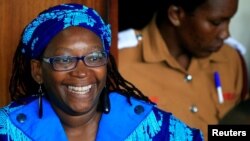In Uganda, the case of a university lecturer jailed last month for allegedly insulting the president on Facebook has revived concern over what civil society groups say are growing efforts to limit freedom of expression in the country.
Civil society groups in Uganda continue to campaign for the release of Stella Nyanzi. She remains behind bars awaiting a bail hearing, charged over allegedly calling President Yoweri Museveni “a pair of buttocks” in an online post. The university researcher had been on a public campaign to urge the president to fulfill his promise to provide sanitary pads to poor school girls.
“We are seeing a state that is increasingly becoming intolerant of free speech, of right for association and so we demand that Stella Nyanzi is freed,” explained Catherine Kanabahita, the Executive Director of the Development Network of Indigenous Voluntary Association.
Uganda’s constitution guarantees freedom of speech and expression, which the U.S. ambassador to Uganda, Debora Malac, pointed out during an event Wednesday for World Press Freedom Day.
“Dr. Nyanzi’s case, however, shows that such constitutional rights and freedoms apparently have limits particularly when those opinions are critical of the country’s leaders,” said Malac.
But deputy government spokesperson Colonel Shaban Bantariza told VOA social media must be regulated.
“If you write insults for example in this newspaper, I can sue you, but am I able to sue you if you throw something on social media. Is there any law that would protect me and I would use to defend myself if I went to court against you? It’s still hazy. Anybody who wants to insult others using social media, certainly the law must shut his mouth. If that’s stifling, that’s justified,” he said.
The Public Order Management Act of 2013 limited public gatherings and demonstrations, something that rights activists say has pushed more Ugandans to express themselves online.
And the number of smartphone users has grown to 22 million, according to government statistics.
Jeff Wokulira Ssebaggala is the Chief Executive Officer of the Unwanted Witness, which seeks to create secure, uncensored online platforms in Uganda.
“In a span of less than year, we have seen over five citizens have been arrested, have been summoned, have been interrogated, have been charged. And the popular charge has been offensive communication,” he said.
Uganda is not alone. Cameroon, Zimbabwe and Ethiopia are among the other African countries that have begun policing online discourse. During the contested 2015 elections, Uganda cut access social media sites for days at a time. The government cited national security reasons.
Last month, parliament passed an amendment to the Uganda Communications Commissions Act that gives the Minister for Information, Communications and Technology enhanced power to regulate and restrict social media use without needing to seek the approval of parliament. That new law is currently before the president for his signature.
Ugandan human rights lawyer Nicholas Opio said attempts to police the internet may prove futile.
“Presently what they are using is a raft of laws including the Computer Misuse Act, including Penal Code Act. So there is no single legislation yet, so what they are doing is resorting to other criminal laws to try and restrict social media, but I don’t think people are going to be cowed away. They can threaten a few people but many more people are going to come,” said Opio.
He pointed to the emerging use of pseudonyms to post online about the government and controversial topics in Uganda. Attempts over the past two years to identify the person behind one of the most well-known accounts, "Tom Okwalinga Voltare," have failed.




